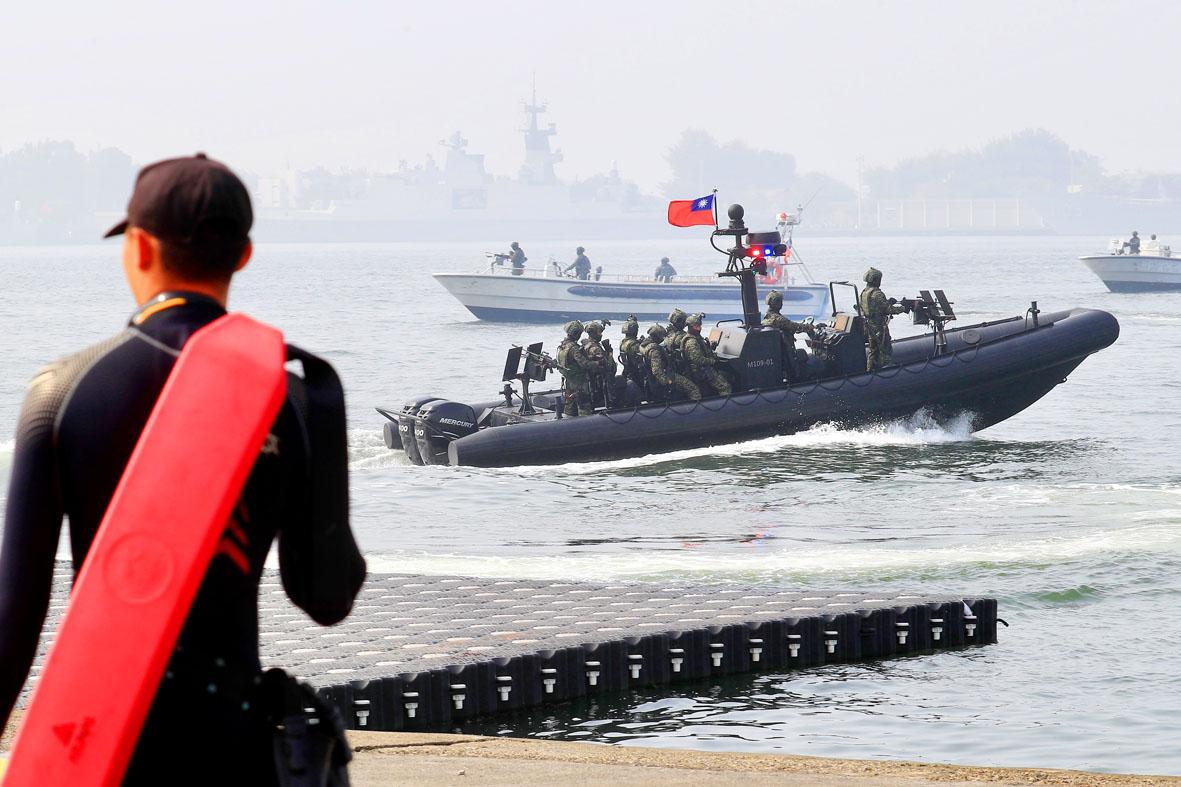Military experts yesterday urged the Ministry of National Defense to increase defense spending to at least NT$400 billion (US$14.15 billion).
The academics made the suggestions after China on Friday unveiled its national defense budget of 1.35 trillion yuan (US$208 billion), which is 16 times larger than Taiwan’s defense budget of NT$361.7 billion.
Su Tzu-yun (蘇紫雲), director of the Institute of National Defense and Strategic Research’s division of defense strategy and resources, said the year-on-year increase of Chinese defense spending was political and defense-related.

Photo: EPA-EFE
The year 2027 would mark the centennial of the founding of the Chinese People’s Liberation Army (PLA), which it plans to celebrate by launching its third carrier, and continuing production of Type 075 amphibious assault ships, Type 096 ballistic missile submarines and H-20 stealth bombers, Su said.
The new units would allow China to stabilize its influence within the first island chain and further project its power into the second island chain, satisfying Beijing’s military and political goals, he said.
The increased production of military hardware would also be in line with Chinese President Xi Jinping’s (習近平) promotion of a “dual circulation” strategy, as it would stimulate the economy, bolster the military and achieve political stability, Su said.
Su also said the ministry should scale its defense spending to at least NT$400 billion to balance the military’s upkeep costs and investment in precision munition and platforms.
National Taiwan University associate professor of political science Chen Shih-min (陳世民) said that the disparity in defense spending across the Taiwan Strait has been extant for many years, adding that the Chinese military’s near-daily incursions into Taiwan’s air defense identification zone over the past half year is clearly hostile and threatening.
Despite this, Taiwan’s national defense has failed to comprise 3 percent of its GDP, while Israel, which faces military threats that are no less severe than Taiwan’s, has maintained defense spending equal to 5 percent of its GDP, he said.
Chen said that he was not arguing for a military arms race with China, but current defense spending would be hard-pressed to keep up with the cost of arms sales packages announced under former US president Donald Trump and President Tsai Ing-wen’s (蔡英文) adoption of an indigenous arms manufacturing program.
Sheu Jyh-shyang (許智翔), a postdoctoral fellow at the Institute for National Defense and Security Research, said that the disparate funding available to Taiwan and Chinese militaries lends more credence to support asymmetric warfare.
Sheu cited the use of large quantities of precision munitions to target platforms developed by China, as an example of goals for Taiwan to focus on.

NATIONAL SECURITY THREAT: An official said that Guan Guan’s comments had gone beyond the threshold of free speech, as she advocated for the destruction of the ROC China-born media influencer Guan Guan’s (關關) residency permit has been revoked for repeatedly posting pro-China content that threatens national security, the National Immigration Agency said yesterday. Guan Guan has said many controversial things in her videos posted to Douyin (抖音), including “the red flag will soon be painted all over Taiwan” and “Taiwan is an inseparable part of China,” while expressing hope for expedited “reunification.” The agency received multiple reports alleging that Guan Guan had advocated for armed reunification last year. After investigating, the agency last month issued a notice requiring her to appear and account for her actions. Guan Guan appeared as required,

A strong cold air mass is expected to arrive tonight, bringing a change in weather and a drop in temperature, the Central Weather Administration (CWA) said. The coldest time would be early on Thursday morning, with temperatures in some areas dipping as low as 8°C, it said. Daytime highs yesterday were 22°C to 24°C in northern and eastern Taiwan, and about 25°C to 28°C in the central and southern regions, it said. However, nighttime lows would dip to about 15°C to 16°C in central and northern Taiwan as well as the northeast, and 17°C to 19°C elsewhere, it said. Tropical Storm Nokaen, currently

PAPERS, PLEASE: The gang exploited the high value of the passports, selling them at inflated prices to Chinese buyers, who would treat them as ‘invisibility cloaks’ The Yilan District Court has handed four members of a syndicate prison terms ranging from one year and two months to two years and two months for their involvement in a scheme to purchase Taiwanese passports and resell them abroad at a massive markup. A Chinese human smuggling syndicate purchased Taiwanese passports through local criminal networks, exploiting the passports’ visa-free travel privileges to turn a profit of more than 20 times the original price, the court said. Such criminal organizations enable people to impersonate Taiwanese when entering and exiting Taiwan and other countries, undermining social order and the credibility of the nation’s

‘SALAMI-SLICING’: Beijing’s ‘gray zone’ tactics around the Pratas Islands have been slowly intensifying, with the PLA testing Taiwan’s responses and limits, an expert said The Ministry of National Defense yesterday condemned an intrusion by a Chinese drone into the airspace of the Pratas Islands (Dongsha Islands, 東沙群島) as a serious disruption of regional peace. The ministry said it detected the Chinese surveillance and reconnaissance drone entering the southwestern parts of Taiwan’s air defense identification zone early yesterday, and it approached the Pratas Islands at 5:41am. The ministry said it immediately notified the garrison stationed in the area to enhance aerial surveillance and alert levels, and the drone was detected in the islands’ territorial airspace at 5:44am, maintaining an altitude outside the effective range of air-defense weaponry. Following